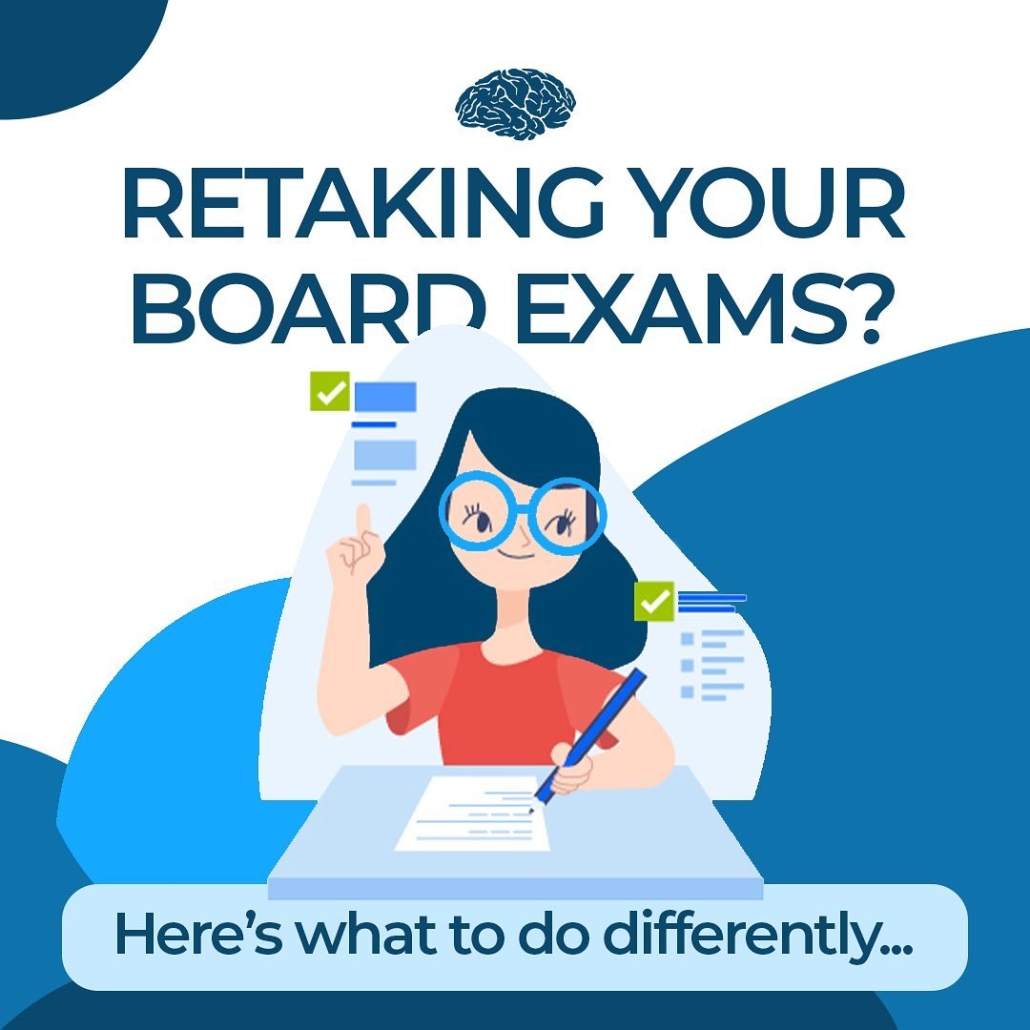The time has finally come… you’re locked in, ready to go, and you’re going to ace your retake exam. Why? Because you’ve followed our TOP 5 tips that ensure your success in passing your Psychiatric Board Exam with ease!
1 – Analyze Your Weak Points
If you know where you struggled with most in the last board exam you can hone in on intaking as much information as you can retain. These don’t need to just be areas you did pool on previously, but could also be ones that could be further reinforced. Try out My Psych Board’s customizable tests that zero in on your most missed questions!
2 – Focus On The NOW
The past is the past, there’s no point in going back! The only way to move in a positive direction is forward. Learn from your mistakes and how you can apply what you’ve learned for better-guaranteed results. If you stay focused on past failure it’s only going to bring negativity and additional stress to your study sessions.
3 – Create A Plan
When studying it’s essential to make the most of your time. Create a plan tailored to your needs. Before you can even begin studying you need to make sure you have all the resources you need. Organize items into folders, check you have all the materials you need, and tidy up your study spot.
4 – Utilize Detailed Questions Banks (like ours here)
With detailed Q-Banks, you’ll get the blueprints, questions, detailed information, vignettes, and more! Within the question breaks, you can get real-time feedback on correct answers, and learn where you’ll need to continue to improve.
BONUS TIP: Did you know we offer FREE Trials of all of our Question Banks? Click here to try today (with no credit card required…)
5 – Take Regular Breaks
As with anything don’t overdo it, You need to ensure you aren’t pushing yourself too far! When you’re studying and preparing for the exam you’re taking a mental health break. This will help break up your studying time, keep you from feeling overwhelmed, and ensure you’re retaining all the information you’re taking in.
Still, feeling uneasy? Contact us and we can help YOU pass your boards with ease!




Syndrome Series: Illness Anxiety Disorder
/in General, StudyingWhat is Illness Anxiety?
Illness Anxiety Disorder is a fairly new condition that was added to the DSM-V under the section of somatic symptom and related disorders. It is the preoccupation with having or acquiring a serious illness, generally in the absence of somatic symptoms. This is accompanied by a high level of anxiety about health, and individuals who have this condition perform excessive health-related behaviors such as checking for abnormalities on the body. . This condition can be care-seeking (where the individual is seeking physician visits, tests, and procedures at an unnecessary rate) or care-avoidant (where the individual avoids physician visits, tests, or procedures in fear of discovering an illness).
Illness Anxiety and Hypochondriasis
Prior to somatic symptom and related disorders being acquired, people fitting these criteria were generally referred to as hypochondriacs. Now, about 75% of those individuals have a somatic symptom disorder diagnosis. The other 25% are diagnosed with illness anxiety. Hypochondriasis is not considered an anxiety disorder and may have somatic symptoms present; illness anxiety is considered an anxiety disorder related to somatic symptom disorders due to the physical checking and specified anxiety related to ones health.
Illness Anxiety Comorbidities
As a newer condition, comorbidities to illness anxiety are not well understood. Currently it is expected that two-thirds of individuals with illness anxiety also are likely to have at least one other major mental health issue. Hypochondriasis is commonly seen to co-occur with anxiety disorders such as generalized anxiety, panic disorder, OCD, as well as depression. Since these conditions share similarities, these could be reasonable comorbidities to be aware of.
First Line Treatments
Treatment options for this condition focus on the ability to manage anxiety symptoms. This can include both psychotherapy and pharmaceutical therapy. The most common psychotherapy used is cognitive behavioral therapy (CBT). Mayo Clinic outlines the following as the goals of CBT in regard to illness anxiety disorder.
Psychotherapy Objectives
Pharmaceuticals
The next option for treatment is selective serotonin reuptake inhibitors (SSRIs) or serotonin-norepinephrine reuptake inhibitors (SNRIs). These medications work well for anxiety disorders as well as depressive disorders, and have shown efficacy in the treatment of illness anxiety. They also have lower rates of side effects and higher rates of tolerability. They offer safe options for a variety of patients, including patients that are pregnant.
Ready to learn more?
Give our question banks a try- FREE- using our Free Trial! Or if you’re ready to take the plunge, check out our Question Banks and find the perfect fit for you! Or, contact us with any questions you have so we can get you on the right path today!
REFERENCES:
American Psychiatric Association. (2022). Diagnostic and statistical manual of mental disorders (5th ed., text rev.). https://doi.org/10.1176/appi.books.9780890425787
French JH, Hameed S. Illness Anxiety Disorder. [Updated 2022 Apr 28]. In: StatPearls [Internet]. Treasure Island (FL): StatPearls Publishing; 2022 Jan-. Available from: https://www.ncbi.nlm.nih.gov/books/NBK554399/
Mayo Clinic:https://www.mayoclinic.org/diseases-conditions/illness-anxiety-disorder/diagnosis-treatment/drc-20373787
How does perfectionism affect your life?
/in Health and Wellness, StudyingAre you a self-diagnosed perfectionist? Or maybe you know someone else who says they are. It may seem like people with a proclivity for perfectionism have a higher degree of finesse or accomplishment. This can be intimidating for those of us that don’t identify with this mindset. It can make you feel like your performance or abilities are less-than in comparison. But did you know the data doesn’t really support this idea?
Perfection is Unattainable (And Unassociated with…)
Yep, you read that right. Try as we might, no one is perfect (duh!). This is obvious, and, particularly in the psychiatric field, it becomes a mantra of sorts that we share with clients and patients as a way to soothe their worries. What’s more, perfectionism isn’t actually associated with academic success of accomplishment.
But wait, you say, I know someone who says they’re a perfectionist and they’re so smart! Sure they are. But a study conducted (back in the 90’s!) on academically gifted students versus typical cohort students found that there was no association between self-perceived perfectionism and academic giftedness (Parker, 1996). Another study by the same author looked only at academically talented students and assessed perfectionism within that group and found a normal distribution of non-perfectionistic type (32.8%), healthy perfectionistic type (41.7%), and dysfunctional perfectionistic type (25.5%), further suggesting perfectionism is not highly associated with academic accomplishment (Parker, 1997).
What Perfectionism IS…
Perfectionism can actually hurt the people that feel this way. Perfectionism is strongly associated with negative symptoms of anxiety, depression, obsessive compulsive inclinations, and distress. This is due to the impossible task of trying to achieve something we – quite literally- cannot. It also can wreck havoc when taking a standardized test that penalizes for missing answers. Instead of taking a best guess and moving on when encountering a difficult question, a perfectionist tends to sit and agonize because they want to be sure. They want to know their answers are just right.
Does this mean those that live for attention to detail and dotting all the i‘s and crossing the t‘s are doomed? Of course not! Everyone has strengths and weaknesses that contribute to what makes them unique. The important thing to see here is that whether or not you like perfectionism, it does not predict your ability to be a competent physician, psychiatrist, student, or worker.
For the perfectionist and non-perfectionist alike, give our question banks a try- FREE- using our Free Trial! Or if you’re ready to take the plunge, check out our Question Banks and find the perfect 😉 fit for you! Or, contact us with any questions you have.
REF: Parker, W. D., & Mills, C. J. (1996). The incidence of perfectionism in gifted students. Gifted Child Quarterly, 40(4), 194-199.
Parker, W. D. (1997). An empirical typology of perfectionism in academically talented children. American Educational Research Journal, 34(3), 545-562.
Avoiding Burnout at the End of the Year
/in Health and WellnessWe’re almost to the finish line of 2022! This time of year is rife with the possibilities of BURNOUT. Are you starting to feel the creeping feelings of exhaustion, alienation, or reduced performance? Or just feeling like you’re ready to be DONE with this phase? Burnout is common, especially among care providers, but it doesn’t have to take over your Holiday season. We have tips and tricks on how to avoid the end of year burnout so you can finish out strong.
What is burnout and why are we talking about this?
First, what exactly is burnout, and what causes it? This might seem like a silly question. But it’s worth talking about for a second. According to Mayo Clinic, burnout is “…a state of physical or emotional exhaustion that also involves a sense of reduced accomplishment and loss of personal identity”. In other words, you’ve been doing the same (or similar enough) things for a long time and you’ve reached your capacity to keep doing it at the same performance level.
This is important to talk about because burnout and depression share a lot of similar symptoms. And while you might be experiencing the dragging feeling of typical tiredness, late October through end of February are the months when some folks tend to face the worst symptoms of depression as well. Why? A few reasons are the culprit: Seasonal Affective Disorder (SAD), spurred by the lack of sunshine and being cooped up inside, holidays spent without family or friends (whether due to a death or alienation), or inversely holidays spent WITH family or friends that are not safe to be around can be the top of the list.
Depression and burnout can feel the same, except for a few key differences. Burnout almost always is focused around performance of a task, such as school or a job or even long term care of a loved one. You feel tired, cynical, irritable, emotionally numb, have trouble concentrating or getting going, or gastrointestinal issues. Depression involves all of these, but also low self esteem, hopelessness, and/or suicidal ideation. For your own wellbeing, it’s essential to distinguish between these two things.
If you are experiencing thoughts of harming yourself or others please reach out for help. Call 988 to contact the Suicide and Crisis Lifeline for 24/7 free access to support.
Let’s talk about how to help!
Ok, this is easier said than done (as most things are). You’re experiencing some burnout, whether that is from finals, rotations, school demands, or your current work position. We have some ideas on how to help you get through the next few weeks or months:
REF: Depression: What is burnout? Informed Health Online. https://www.informedhealth.org/what-is-burnout.html. Accessed May 13, 2021
Swenson S, Shanafelt T. Mayo Clinic Strategies to Reduce Burnout: 12 Actions to Create the Ideal Workplace. Oxford University Press; 2020.